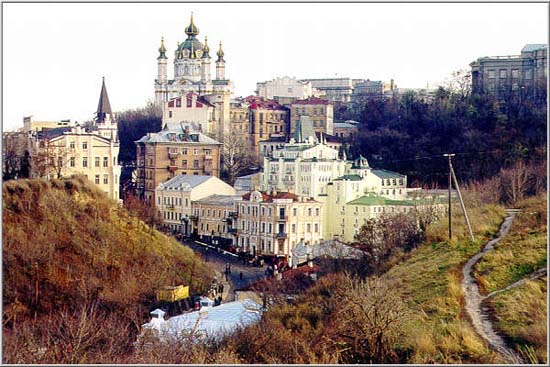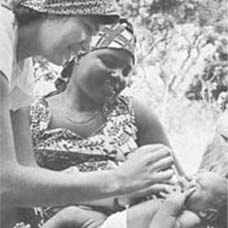
Peace Corps Volunteer Jeffrey Hartman says "In the two years I have spent living in Ukraine, I have never seen anything like the events of recent days"
Resilient Ukrainians in for the long haul
By JEFFREY G. HARTMAN
IN THE two years I have spent living in Ukraine, I have never seen anything like the events of recent days.
Ukrainians have many admirable qualities - they are hard working and hospitable, yet they generally tend to be fatalistic people.
So I was both pleased and shocked to see them take charge of their own lives as they took to the streets in protest after Prime Minister Viktor Yanukovich's disputed "victory" in the second round of the 2004 Ukrainian presidential elections.
I completed my service as a Peace Corps volunteer in Ukraine two days before the Nov. 21 run-off election between opposition candidate Viktor Yushenko, a pro-Europe, pro-democracy former prime minister, and Mr. Yanukovich, the current prime minister and a twice-convicted felon who pledges to strengthen ties with Russia.
I had planned to travel to nearby countries before heading home to Toledo. But the events that transpired prompted me to stay in the country and watch the citizens of Ukraine defend their freedom.
The day after the election I was watching Ukraine's only TV station not controlled by Leonid Kuchma, the current president of Ukraine, or Viktor Pinchuk, Mr. Kuchma's son-in-law.
The news showed hundreds of thousands of demonstrators rolling into Independence Square in downtown Kiev, waving orange flags in support of Viktor Yushenko.
As I witnessed Ukrainians standing up for themselves in protest of the falsified elections, I knew that something unique was happening in the country.
Working as a university instructor in the city of Ternopil in western Ukraine, I had often discussed aspects of Ukrainian society with my students.
Tradition is deeply imbedded in Ukrainian culture, and I often heard the indolent answer, "This is just our Ukrainian mentality."
It was my job to encourage students to think for themselves, so to hear such aloof acceptance was always disappointing and frustrating.
But when I saw the masses of protesters gathering in the capital, I knew that something great was happening. I boarded a train for Kiev that evening in order to get a closer look at the action.
The time that I spent immersing myself in the demonstrations in Kiev revealed aspects of the Ukrainian character that I had never known to exist.
People from all edges of this ethnically divided land came in droves to support one another in their fight for democracy. The protesters multiplied each day as trains and private buses carted citizens into the capital, and by the third day more than 1 million people had gathered in the streets.
A festive, almost carnival atmosphere greeted me as I strolled around Khreshatyk Street in downtown Kiev. I sensed a subtle confidence amongst these often-pessimistic people.
Speeches calling for freedom by Mr. Yushenko and his political allies were met with howling cheers. Popular celebrities were applauded for their support of the "revolution."
In a country where freedom of speech is more a fallacy than a law, I was surprised to hear the crowds earnestly chanting slogans that called Prime Minister Yanukovich a "fool," and the Central Election Committee "cheaters."
The behavior being displayed by the Ukrainian people during what is arguably the most important event in the country's history is remarkable.
Although the people are strong they show no signs of aggression.
I saw students placing yellow flowers, a symbol of a parting of ways, in the shields of riot police who defended the presidential administration headquarters.
People regarded the police in battle gear as men simply earning a day's wages. They treated them with peace, singing folk songs and offering them plates of food. I was deeply moved when I saw two of the officers shed tears behind the Plexiglas shields of their war helmets.
In the long lines for free tea and food rations, people conducted themselves with a courtesy and politeness that I have rarely seen in the country.
The ubiquitous cutting and rudeness that usually plagues lines in the former Soviet Union were absent. Instead, I witnessed people patiently waiting their turns while engaging in small talk.
The events in Kiev are but one example of a nation finally standing up for itself. Across the country people are also gathering in city squares.
Voices calling for freedom and democracy can be heard in the streets of traditionally patriotic cities in the west such as L'viv and Ivano-Frankivsk, as well as in eastern metropolises like Kharkiv, where Russian influence has long dominated the culture.
Since Ukraine's independence in 1991, this is perhaps the first time that both the Ukrainian-speaking west and the Russian-speaking east have united.
But despite the good nature of the people, they are firmly determined to stay in the streets until justice is served.
In my conversations with citizens rallying in Kiev, I have learned that the people are unwavering, and doggedly committed to "stay to the end." Ukrainians are not often active, but they have always been resilient.
I was surprised to see my hosts take to the streets and fight for their freedom, and I believe them when they say that they will not leave until justice has been served. I feel a certain satisfaction in seeing such inspiration among the people at the end of my service in this country.
Such motivation is not common here, and perhaps it is overdue. The people have finally found their voice and I believe they will shout until they are heard.
Viktor Yanukovich underestimated his people's will to stand up and fight in the wake of a corrupted election. I must admit that I was also guilty of this, as I had never seen any indication in the past that Ukrainians might make the effort to control their own destiny.
The times have changed. Ukrainians have gathered to defend their democracy and will remain in the streets until their freedom is achieved.
Jeffrey Hartman of Toledo is a graduate of St. John's Jesuit High School. He just completed two years in the Peace Corps teaching business in Ternopil, Ukraine.








